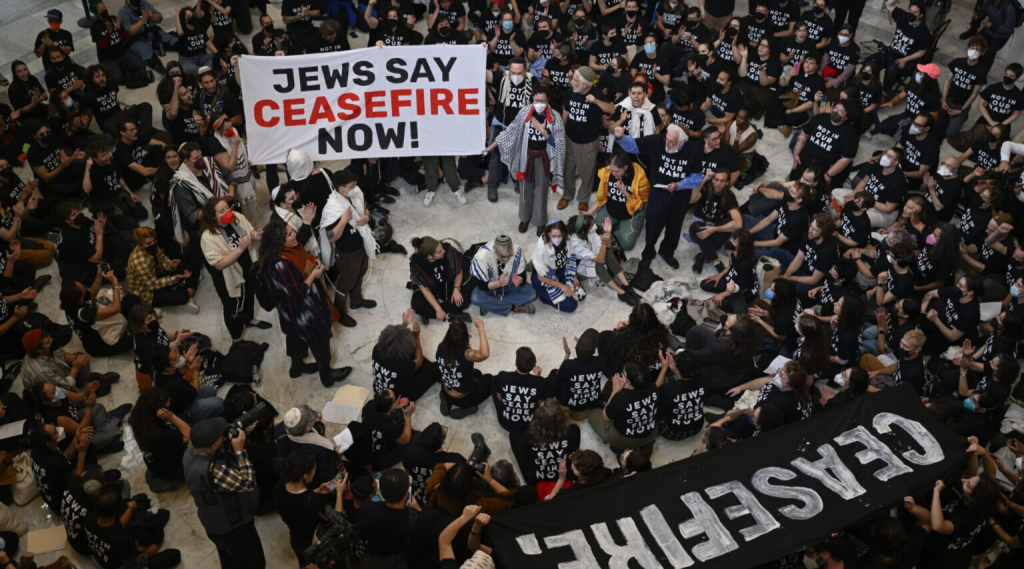Jewish attitudes to the genocide are shifting in Israel and beyond, writes Henry Maitles.
As the toll of deaths in Gaza keeps rising, there are signs that Israeli government statements are being challenged not only by governments and communities across the world, and by left of centre Jews such as myself and others in the broad WhatsApp group Scottish Jews Stand with Palestine, but also by more mainstream Jewry.
On 27 July, the highly respected Israeli human rights groups B’Tselem, and Physicians for Human Rights – Israel, each published reports concluding that Israel is committing genocide in Gaza as defined by international law. Israeli human rights groups have never officially used such terms before. The groups are now calling on the international community to take action against the Israeli government to stop these atrocities. Then, as reported on 5 August, some 600 retired Israeli security officials and ex-government politicians called for an immediate end to the war, claiming it has “ceased to be a just war”. Less than two weeks later, on 17 August, there was a widespread strike and mass demonstration of more than 200,000 in Tel Aviv, demanding a ceasefire and hostage swap, which was violently broken up by the police. Finally, inside Israel there was on 31st August a strike by senior school students against the war, involving thousands across the country, according to Haaretz.
There have been parallel developments outside of Israel. On 27 July, the American Jewish Committee became the first major mainstream Jewish American group to publicly address the starvation in Gaza, in an official statement expressing “immense sorrow for the grave toll this war has taken on Palestinian civilians” and calling on the Israeli government to take action as the responsible power. The next day, on 28 July, the Jewish Reform movement in North America (thought to be largest Jewish denomination in the United States) said that the Israeli government was “culpable” in the spread of hunger in Gaza. Then on 29 July, the Jewish Board of Deputies, the largest mainstream Jewish organisation in UK, issued a statement reaffirming its support for the two-state solution (despite the Israeli Government’s rejection of it), condemning any plan to forcibly remove Gazans, and decrying “extremist settler” violence and “the appalling rhetoric and unacceptable proposals from some Israeli ministers.”

These events and statements are unprecedented and reflect both the general revulsion and anger towards the starvation, and pressure from mass movements on the streets. They are in stark contrast to much public opinion in Israel itself. As the strike and demonstration showed, many Israelis, particularly the families of the hostages, are appalled and opposed to what we have been seeing. Nonetheless, a report of a poll in Israeli daily Haaretz on 6 August claimed that the “vast majority of Israeli Jews – 79 percent – are “not so troubled” or “not troubled at all” by the reports of famine and suffering among the Palestinian population in Gaza”. What this suggests is that an ‘othering’ of the Palestinians has been engineered and won in Israel by the far-right settler parties and their extreme right government representatives. The finance minister Smotrich, for example, calls himself a ‘fascist homophobe’ and was happy during a visit to the West Bank to be pictured beside “Death to Arabs” graffiti.
As we know from history, where ‘othering’ is successful, atrocities and indifference follow. Indeed, we need to understand that the Netanyahu government aligns itself with those far-right governments across the world who are both antisemitic and pro-Israeli. They are tied with the ‘othering’ of Muslims and with islamophobia.
What does all this mean for those of us who oppose Israeli actions in Gaza? Firstly, it provides another layer of evidence for the growing numbers calling for ceasefire, for unrestricted aid to flow into Gaza, and for condemnation of the non-UN aid efforts of the Israeli and the US mercenaries, who have murdered some 1,000 Gazans since the so-called Gaza Humanitarian Foundation scheme was put in place in May. The testimony from Israeli soldiers and some of these US mercenaries is damning. Secondly, it supports a growing belief that the denial of Israeli responsibility for the hunger is a lie and a disgrace. Thirdly, it makes it harder to deny that the breakdown of law and order and the gangsterism in Gaza is a straight consequence of the lack of aid, not the cause of the lack of aid. When there is lack of food, water, medicines, people act badly. The scramble for scarcity can often bring out an animal response. Primo Levi said “How to survive Auschwitz? Eat your own bread and if you can that of your neighbour”. The Nazis claimed there were no shortages as people were dying from malnutrition in the Warsaw Ghetto during the Second World War.
But do these developments contribute to any solution? Discounting the Israeli settler and current government ethnic cleansing option, two solutions are most often suggested. Some say two states is best, and others want to see a single democratic state for all. Both are clearly fraught with problems. The phrase ‘devil in the detail’ might have been invented for this. An Israeli government decision of 14 August to build a further massive network of settlements in the West Bank, specifically to ensure that a two-state solution is unworkable, needs urgent opposition. These discussions will only happen when there is no mass starvation and death. The demand must be for a ceasefire now, Israeli withdrawal from Gaza, a huge humanitarian effort, and hostage/prisoner swaps. It must also include a demand for a discussion on the future of the region. Our job is to continue with the mass demonstrations, signal our support for the de-proscribing of Palestine Action as a terrorist organisation, and, crucially, to widen the calls for BDS activities through the trade union movement.
Henry Maitles is emeritus professor of education at the University of the West of Scotland.